University Nutrition Article Review: Carbohydrate and Aging Study
VerifiedAdded on 2023/01/18
|6
|1321
|47
Report
AI Summary
This report provides a review of the research article "Association Between Carbohydrate Nutrition and Successful Aging Over 10 Years" by Gopinath et al. (2016). The study, a prospective cohort study, investigated the relationship between various aspects of carbohydrate nutrition including dietary carbohydrate, glycemic index, fiber, and sugar intake, and successful aging in adults aged 49 and older. The researchers followed 1,609 participants over ten years, collecting dietary data through a food frequency questionnaire and assessing successful aging through questionnaires. The findings indicated that higher intake of dietary fiber, especially from sources like bread, cereals, and fruits, was associated with successful aging. The review discusses the study's design, findings, and limitations, including potential recall bias and the inability to establish causality due to the data collection method. The report emphasizes the role of diet, particularly the Mediterranean diet, in overall health and successful aging, highlighting the importance of fiber-rich foods. The review also includes a discussion of the study's validity and generalizability, as well as the implications of the findings for individual dietary choices.

1
Article review
University
Unit
Name
Tutor
Article review
University
Unit
Name
Tutor
Paraphrase This Document
Need a fresh take? Get an instant paraphrase of this document with our AI Paraphraser
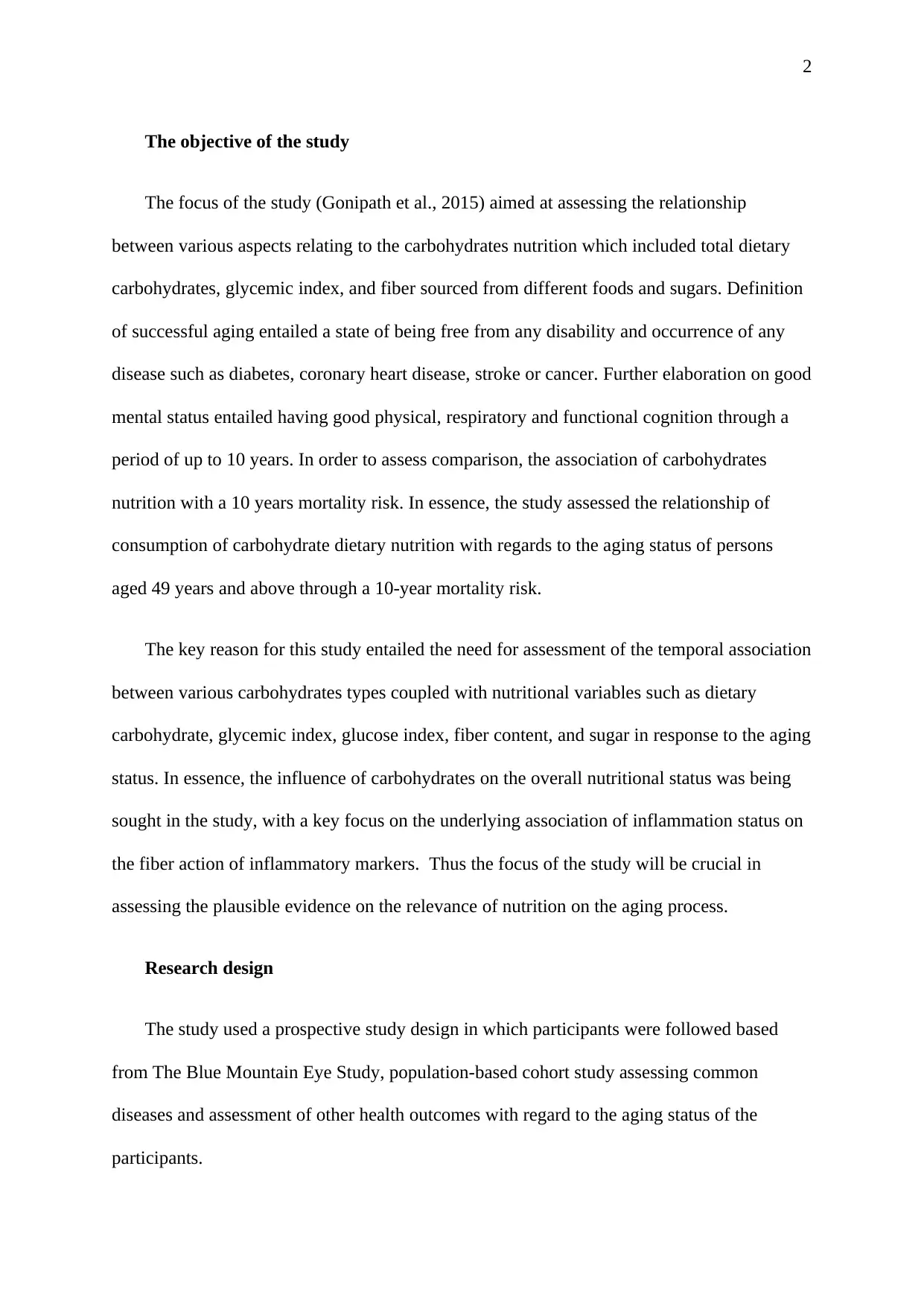
2
The objective of the study
The focus of the study (Gonipath et al., 2015) aimed at assessing the relationship
between various aspects relating to the carbohydrates nutrition which included total dietary
carbohydrates, glycemic index, and fiber sourced from different foods and sugars. Definition
of successful aging entailed a state of being free from any disability and occurrence of any
disease such as diabetes, coronary heart disease, stroke or cancer. Further elaboration on good
mental status entailed having good physical, respiratory and functional cognition through a
period of up to 10 years. In order to assess comparison, the association of carbohydrates
nutrition with a 10 years mortality risk. In essence, the study assessed the relationship of
consumption of carbohydrate dietary nutrition with regards to the aging status of persons
aged 49 years and above through a 10-year mortality risk.
The key reason for this study entailed the need for assessment of the temporal association
between various carbohydrates types coupled with nutritional variables such as dietary
carbohydrate, glycemic index, glucose index, fiber content, and sugar in response to the aging
status. In essence, the influence of carbohydrates on the overall nutritional status was being
sought in the study, with a key focus on the underlying association of inflammation status on
the fiber action of inflammatory markers. Thus the focus of the study will be crucial in
assessing the plausible evidence on the relevance of nutrition on the aging process.
Research design
The study used a prospective study design in which participants were followed based
from The Blue Mountain Eye Study, population-based cohort study assessing common
diseases and assessment of other health outcomes with regard to the aging status of the
participants.
The objective of the study
The focus of the study (Gonipath et al., 2015) aimed at assessing the relationship
between various aspects relating to the carbohydrates nutrition which included total dietary
carbohydrates, glycemic index, and fiber sourced from different foods and sugars. Definition
of successful aging entailed a state of being free from any disability and occurrence of any
disease such as diabetes, coronary heart disease, stroke or cancer. Further elaboration on good
mental status entailed having good physical, respiratory and functional cognition through a
period of up to 10 years. In order to assess comparison, the association of carbohydrates
nutrition with a 10 years mortality risk. In essence, the study assessed the relationship of
consumption of carbohydrate dietary nutrition with regards to the aging status of persons
aged 49 years and above through a 10-year mortality risk.
The key reason for this study entailed the need for assessment of the temporal association
between various carbohydrates types coupled with nutritional variables such as dietary
carbohydrate, glycemic index, glucose index, fiber content, and sugar in response to the aging
status. In essence, the influence of carbohydrates on the overall nutritional status was being
sought in the study, with a key focus on the underlying association of inflammation status on
the fiber action of inflammatory markers. Thus the focus of the study will be crucial in
assessing the plausible evidence on the relevance of nutrition on the aging process.
Research design
The study used a prospective study design in which participants were followed based
from The Blue Mountain Eye Study, population-based cohort study assessing common
diseases and assessment of other health outcomes with regard to the aging status of the
participants.
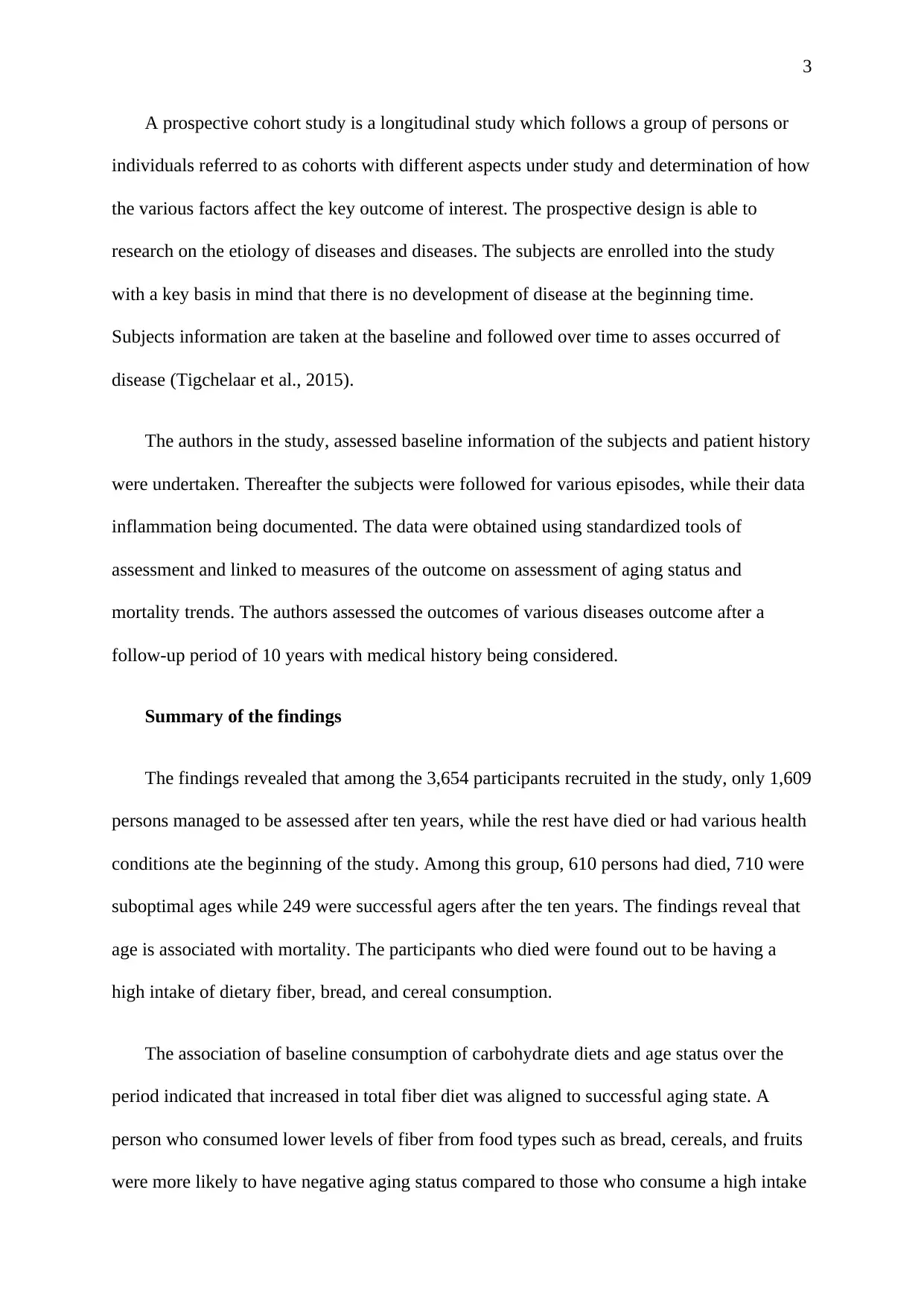
3
A prospective cohort study is a longitudinal study which follows a group of persons or
individuals referred to as cohorts with different aspects under study and determination of how
the various factors affect the key outcome of interest. The prospective design is able to
research on the etiology of diseases and diseases. The subjects are enrolled into the study
with a key basis in mind that there is no development of disease at the beginning time.
Subjects information are taken at the baseline and followed over time to asses occurred of
disease (Tigchelaar et al., 2015).
The authors in the study, assessed baseline information of the subjects and patient history
were undertaken. Thereafter the subjects were followed for various episodes, while their data
inflammation being documented. The data were obtained using standardized tools of
assessment and linked to measures of the outcome on assessment of aging status and
mortality trends. The authors assessed the outcomes of various diseases outcome after a
follow-up period of 10 years with medical history being considered.
Summary of the findings
The findings revealed that among the 3,654 participants recruited in the study, only 1,609
persons managed to be assessed after ten years, while the rest have died or had various health
conditions ate the beginning of the study. Among this group, 610 persons had died, 710 were
suboptimal ages while 249 were successful agers after the ten years. The findings reveal that
age is associated with mortality. The participants who died were found out to be having a
high intake of dietary fiber, bread, and cereal consumption.
The association of baseline consumption of carbohydrate diets and age status over the
period indicated that increased in total fiber diet was aligned to successful aging state. A
person who consumed lower levels of fiber from food types such as bread, cereals, and fruits
were more likely to have negative aging status compared to those who consume a high intake
A prospective cohort study is a longitudinal study which follows a group of persons or
individuals referred to as cohorts with different aspects under study and determination of how
the various factors affect the key outcome of interest. The prospective design is able to
research on the etiology of diseases and diseases. The subjects are enrolled into the study
with a key basis in mind that there is no development of disease at the beginning time.
Subjects information are taken at the baseline and followed over time to asses occurred of
disease (Tigchelaar et al., 2015).
The authors in the study, assessed baseline information of the subjects and patient history
were undertaken. Thereafter the subjects were followed for various episodes, while their data
inflammation being documented. The data were obtained using standardized tools of
assessment and linked to measures of the outcome on assessment of aging status and
mortality trends. The authors assessed the outcomes of various diseases outcome after a
follow-up period of 10 years with medical history being considered.
Summary of the findings
The findings revealed that among the 3,654 participants recruited in the study, only 1,609
persons managed to be assessed after ten years, while the rest have died or had various health
conditions ate the beginning of the study. Among this group, 610 persons had died, 710 were
suboptimal ages while 249 were successful agers after the ten years. The findings reveal that
age is associated with mortality. The participants who died were found out to be having a
high intake of dietary fiber, bread, and cereal consumption.
The association of baseline consumption of carbohydrate diets and age status over the
period indicated that increased in total fiber diet was aligned to successful aging state. A
person who consumed lower levels of fiber from food types such as bread, cereals, and fruits
were more likely to have negative aging status compared to those who consume a high intake
⊘ This is a preview!⊘
Do you want full access?
Subscribe today to unlock all pages.

Trusted by 1+ million students worldwide
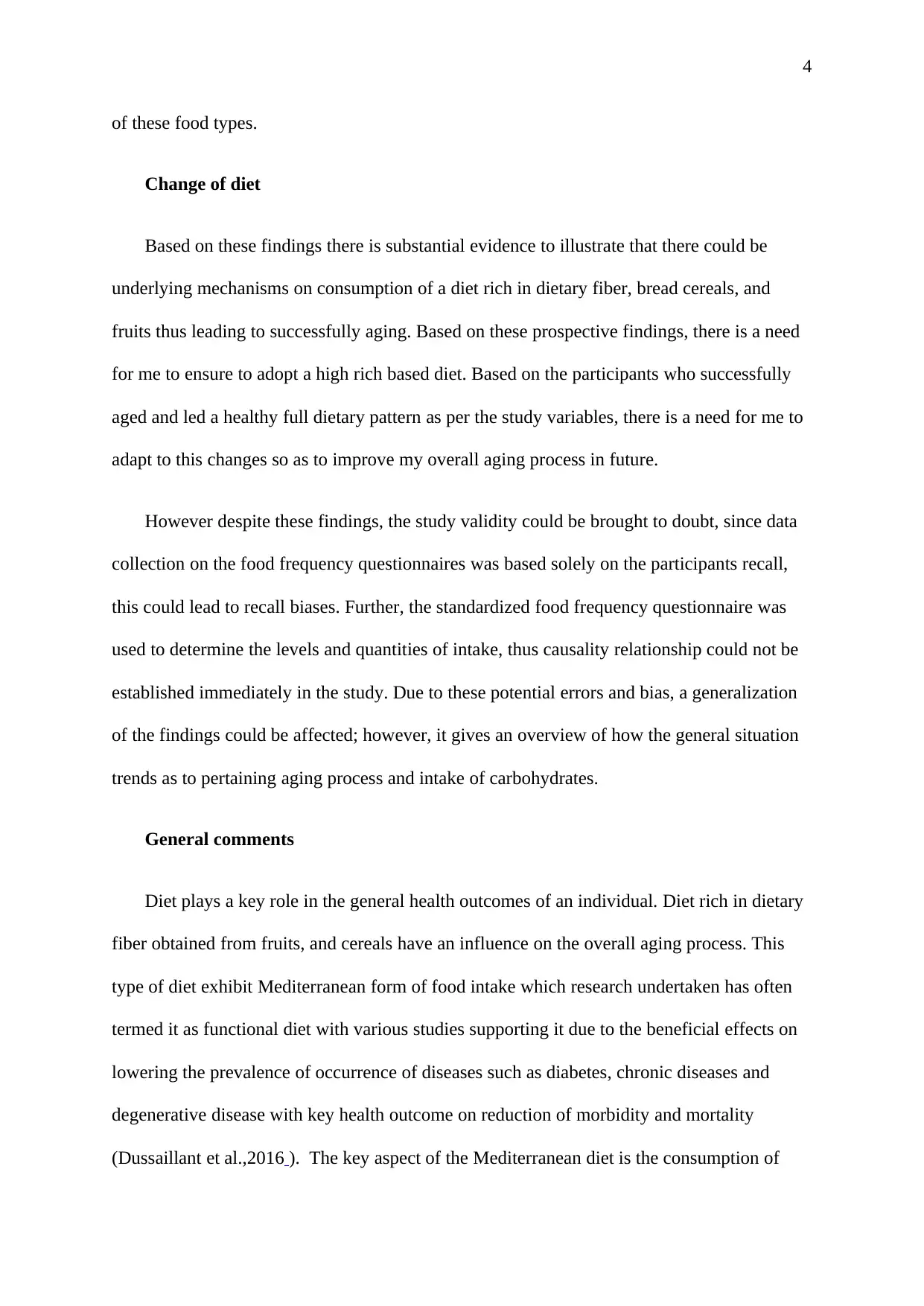
4
of these food types.
Change of diet
Based on these findings there is substantial evidence to illustrate that there could be
underlying mechanisms on consumption of a diet rich in dietary fiber, bread cereals, and
fruits thus leading to successfully aging. Based on these prospective findings, there is a need
for me to ensure to adopt a high rich based diet. Based on the participants who successfully
aged and led a healthy full dietary pattern as per the study variables, there is a need for me to
adapt to this changes so as to improve my overall aging process in future.
However despite these findings, the study validity could be brought to doubt, since data
collection on the food frequency questionnaires was based solely on the participants recall,
this could lead to recall biases. Further, the standardized food frequency questionnaire was
used to determine the levels and quantities of intake, thus causality relationship could not be
established immediately in the study. Due to these potential errors and bias, a generalization
of the findings could be affected; however, it gives an overview of how the general situation
trends as to pertaining aging process and intake of carbohydrates.
General comments
Diet plays a key role in the general health outcomes of an individual. Diet rich in dietary
fiber obtained from fruits, and cereals have an influence on the overall aging process. This
type of diet exhibit Mediterranean form of food intake which research undertaken has often
termed it as functional diet with various studies supporting it due to the beneficial effects on
lowering the prevalence of occurrence of diseases such as diabetes, chronic diseases and
degenerative disease with key health outcome on reduction of morbidity and mortality
(Dussaillant et al.,2016 ). The key aspect of the Mediterranean diet is the consumption of
of these food types.
Change of diet
Based on these findings there is substantial evidence to illustrate that there could be
underlying mechanisms on consumption of a diet rich in dietary fiber, bread cereals, and
fruits thus leading to successfully aging. Based on these prospective findings, there is a need
for me to ensure to adopt a high rich based diet. Based on the participants who successfully
aged and led a healthy full dietary pattern as per the study variables, there is a need for me to
adapt to this changes so as to improve my overall aging process in future.
However despite these findings, the study validity could be brought to doubt, since data
collection on the food frequency questionnaires was based solely on the participants recall,
this could lead to recall biases. Further, the standardized food frequency questionnaire was
used to determine the levels and quantities of intake, thus causality relationship could not be
established immediately in the study. Due to these potential errors and bias, a generalization
of the findings could be affected; however, it gives an overview of how the general situation
trends as to pertaining aging process and intake of carbohydrates.
General comments
Diet plays a key role in the general health outcomes of an individual. Diet rich in dietary
fiber obtained from fruits, and cereals have an influence on the overall aging process. This
type of diet exhibit Mediterranean form of food intake which research undertaken has often
termed it as functional diet with various studies supporting it due to the beneficial effects on
lowering the prevalence of occurrence of diseases such as diabetes, chronic diseases and
degenerative disease with key health outcome on reduction of morbidity and mortality
(Dussaillant et al.,2016 ). The key aspect of the Mediterranean diet is the consumption of
Paraphrase This Document
Need a fresh take? Get an instant paraphrase of this document with our AI Paraphraser
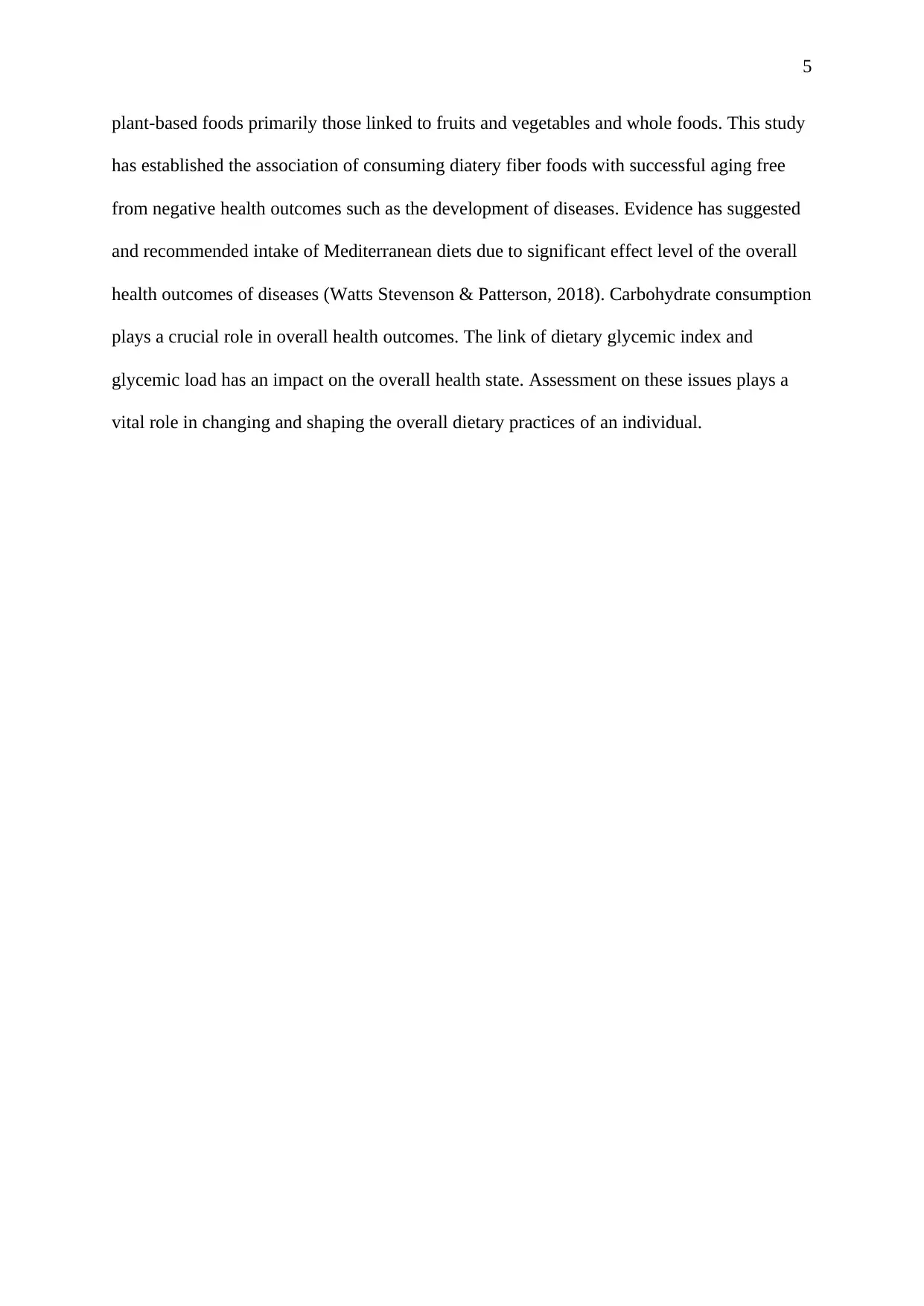
5
plant-based foods primarily those linked to fruits and vegetables and whole foods. This study
has established the association of consuming diatery fiber foods with successful aging free
from negative health outcomes such as the development of diseases. Evidence has suggested
and recommended intake of Mediterranean diets due to significant effect level of the overall
health outcomes of diseases (Watts Stevenson & Patterson, 2018). Carbohydrate consumption
plays a crucial role in overall health outcomes. The link of dietary glycemic index and
glycemic load has an impact on the overall health state. Assessment on these issues plays a
vital role in changing and shaping the overall dietary practices of an individual.
plant-based foods primarily those linked to fruits and vegetables and whole foods. This study
has established the association of consuming diatery fiber foods with successful aging free
from negative health outcomes such as the development of diseases. Evidence has suggested
and recommended intake of Mediterranean diets due to significant effect level of the overall
health outcomes of diseases (Watts Stevenson & Patterson, 2018). Carbohydrate consumption
plays a crucial role in overall health outcomes. The link of dietary glycemic index and
glycemic load has an impact on the overall health state. Assessment on these issues plays a
vital role in changing and shaping the overall dietary practices of an individual.
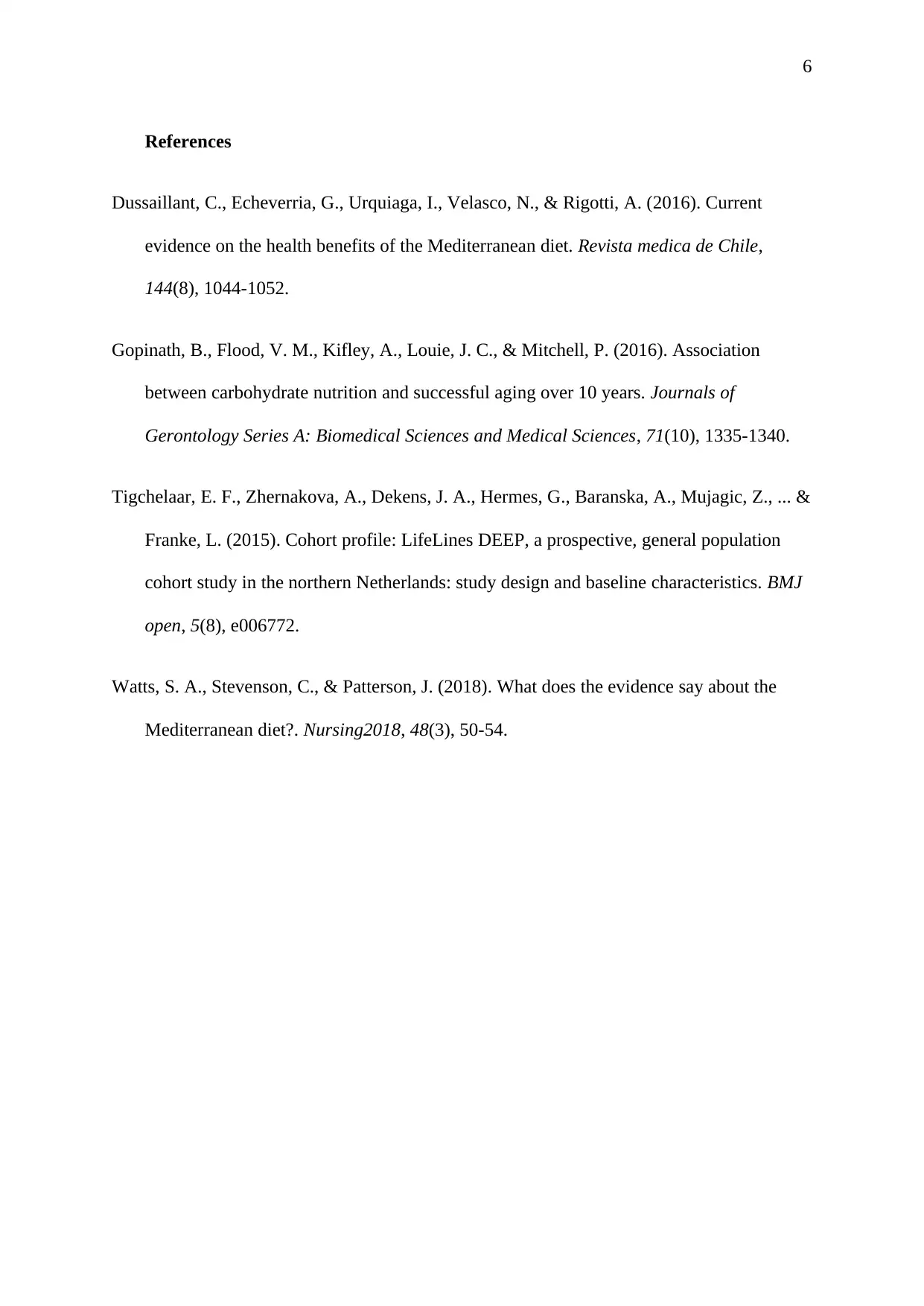
6
References
Dussaillant, C., Echeverria, G., Urquiaga, I., Velasco, N., & Rigotti, A. (2016). Current
evidence on the health benefits of the Mediterranean diet. Revista medica de Chile,
144(8), 1044-1052.
Gopinath, B., Flood, V. M., Kifley, A., Louie, J. C., & Mitchell, P. (2016). Association
between carbohydrate nutrition and successful aging over 10 years. Journals of
Gerontology Series A: Biomedical Sciences and Medical Sciences, 71(10), 1335-1340.
Tigchelaar, E. F., Zhernakova, A., Dekens, J. A., Hermes, G., Baranska, A., Mujagic, Z., ... &
Franke, L. (2015). Cohort profile: LifeLines DEEP, a prospective, general population
cohort study in the northern Netherlands: study design and baseline characteristics. BMJ
open, 5(8), e006772.
Watts, S. A., Stevenson, C., & Patterson, J. (2018). What does the evidence say about the
Mediterranean diet?. Nursing2018, 48(3), 50-54.
References
Dussaillant, C., Echeverria, G., Urquiaga, I., Velasco, N., & Rigotti, A. (2016). Current
evidence on the health benefits of the Mediterranean diet. Revista medica de Chile,
144(8), 1044-1052.
Gopinath, B., Flood, V. M., Kifley, A., Louie, J. C., & Mitchell, P. (2016). Association
between carbohydrate nutrition and successful aging over 10 years. Journals of
Gerontology Series A: Biomedical Sciences and Medical Sciences, 71(10), 1335-1340.
Tigchelaar, E. F., Zhernakova, A., Dekens, J. A., Hermes, G., Baranska, A., Mujagic, Z., ... &
Franke, L. (2015). Cohort profile: LifeLines DEEP, a prospective, general population
cohort study in the northern Netherlands: study design and baseline characteristics. BMJ
open, 5(8), e006772.
Watts, S. A., Stevenson, C., & Patterson, J. (2018). What does the evidence say about the
Mediterranean diet?. Nursing2018, 48(3), 50-54.
⊘ This is a preview!⊘
Do you want full access?
Subscribe today to unlock all pages.

Trusted by 1+ million students worldwide
1 out of 6
Related Documents
Your All-in-One AI-Powered Toolkit for Academic Success.
+13062052269
info@desklib.com
Available 24*7 on WhatsApp / Email
![[object Object]](/_next/static/media/star-bottom.7253800d.svg)
Unlock your academic potential
Copyright © 2020–2026 A2Z Services. All Rights Reserved. Developed and managed by ZUCOL.





